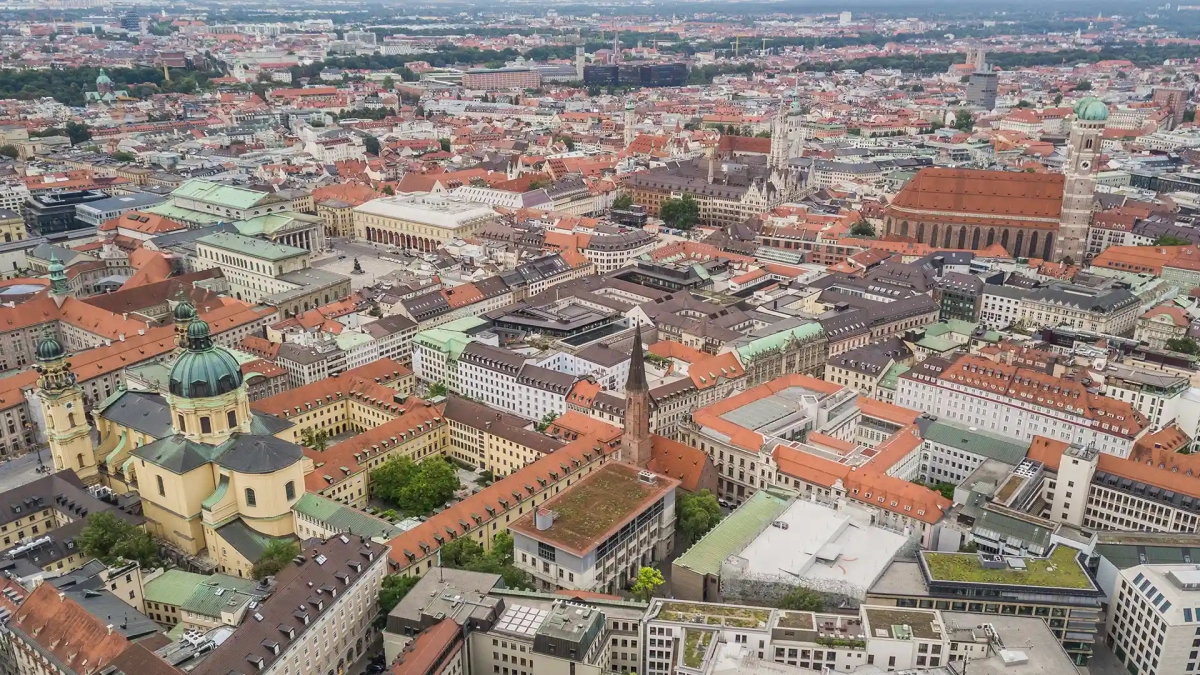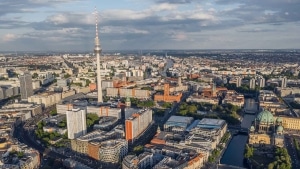Living in Munich as an Expat: Everything You Need to Know
- Living in Munich as an Expat: Everything You Need to Know
- What Makes Munich Popular Among Expats?
- Cost of Living in Munich
- Pros and Cons of Living in Munich as an Expat
- Best Neighborhoods in Munich for Expats
- Taxes and Salaries in Munich
- Safety and Crime in Munich
- Public Holidays and Cultural Norms
- Digital Life and Banking in Munich
- Visa and Residence Types for Expats in Munich
- Quick Summary Table: Living in Munich as an Expat
- Is Munich the Right City for You?
Munich, the capital of Bavaria, is often described as one of Germany’s most livable cities. With its mix of old-world charm and modern innovation, the city attracts expats from around the globe—particularly professionals in tech, engineering, finance, and automotive industries.
But while Munich may be picturesque and prosperous, it’s not without its challenges. This guide breaks down what it’s really like to live in Munich as an expat—from job opportunities and lifestyle to cultural quirks and practical tips.
What Makes Munich Popular Among Expats?
Strong Economy and Career Opportunities
Munich is home to global companies like BMW, Siemens, Allianz, and many fast-growing startups. The city offers excellent job prospects for highly skilled professionals, especially in:
- Engineering and automotive
- IT and software development
- Finance and insurance
- Biotechnology and pharmaceuticals
English-speaking roles exist but are competitive. Learning German significantly improves your chances of landing a job.
Quality of Life
Munich consistently ranks high in global quality of life surveys. Clean streets, reliable public transportation, access to nature, and low crime rates make it an attractive place to live. The city blends a high standard of living with access to lakes, mountains, and scenic countryside—all within a short train ride.
Cost of Living in Munich
Rent in Munich
Munich is the most expensive city in Germany in terms of housing. Renting a one-bedroom apartment in the city center often starts around €1,500 per month (cold rent), with full monthly costs (including utilities) easily reaching €2,000 or more. Securing an apartment also requires patience and a strong application—including proof of income, SCHUFA, and previous landlord references.
Everyday Expenses
- Groceries: Higher than the national average. Expect €300–€400 per month for one person.
- Dining out: A casual meal costs €15–€20; fine dining can be €50+.
- Transport: A monthly public transport pass (MVV) costs €60–€90 depending on zones.
- Health insurance: Mandatory for all residents. Public insurance typically costs €250–€450/month depending on income.
Public Transport and Mobility
Munich’s MVV network includes U-Bahn (subway), S-Bahn (commuter trains), trams, and buses. The system is clean, safe, and punctual. You rarely need a car in the city—though one can be useful if you plan regular trips to the Alps or countryside.
Bike lanes are well-marked, and cycling is popular, though less aggressive than in Berlin. For short trips, car-sharing and e-scooter services are available.
Cultural Life and Leisure
Munich may have a conservative reputation, but it offers rich cultural experiences:
- Theatres and Opera: The Bavarian State Opera is internationally acclaimed.
- Museums: Alte Pinakothek, Deutsches Museum, and Brandhorst are standout institutions.
- Festivals: Oktoberfest is the most famous, but smaller traditional festivals happen year-round.
- Nightlife: More upscale and relaxed compared to Berlin; popular areas include Glockenbachviertel and Schwabing.
For nature lovers, the Isar River and Englischer Garten offer green escapes within the city. In winter, skiing is just a train ride away.
Language and Integration
German is the primary language of communication. While English is common in multinational workplaces and among younger locals, government services, healthcare, and everyday interactions often require at least basic German.
Integration courses and language schools are widely available. Speaking German not only helps professionally but also socially—opening doors to local friendships and a deeper understanding of Bavarian culture.
Education and Schooling
For expats moving with families, Munich offers a range of international schools, including:
- Munich International School
- Bavarian International School
- Lycée Jean Renoir (French)
- European School Munich
Public schools are free but primarily taught in German. For long-term stays, this can be a valuable cultural immersion for children, though language support is essential in the beginning.
Healthcare System
Healthcare in Munich is excellent, with both public and private providers available. Many doctors and specialists speak English, especially in private practices. Expats must choose either public or private health insurance based on employment type, income, or visa requirements.
Make sure your insurance covers everything you need, especially if you’re used to a different system from your home country.
Bureaucracy and Registration in Munich
Germany is known for its bureaucracy, and Munich is no exception. Key steps for new arrivals include:
- Register your address (Anmeldung) within 14 days of moving in
- Get your tax ID for employment
- Set up a German bank account
- Apply for a residence permit (if applicable)
Appointments can take weeks to book, and most forms are in German. Bring all required documents and be punctual—German bureaucracy does not reward improvisation.
Social Life and Making Friends
Munich locals may initially seem reserved, but friendships form through shared activities:
- Join sports clubs, hiking groups, or language meetups
- Attend international networking events or expat meetups
- Volunteer with local organizations
While international communities exist, learning German and getting involved locally helps build genuine, lasting connections.
Pros and Cons of Living in Munich as an Expat
Pros:
- High salaries and strong economy
- Excellent healthcare and education
- Clean, safe, and beautiful environment
- Access to nature and outdoor activities
- Reliable public transport
Cons:
- High cost of housing and daily expenses
- Difficult housing market for newcomers
- Bureaucracy can be frustrating
- Less diversity and nightlife than Berlin
- German language is essential for full integration
Best Neighborhoods in Munich for Expats
Finding the right neighborhood in Munich can make all the difference. Each district offers a unique vibe suited to different lifestyles.
- Schwabing: A lively, artsy neighborhood filled with historic cafes, green parks like Englischer Garten, and proximity to universities. Ideal for students, young professionals, and creatives.
- Glockenbachviertel: Known for its vibrant LGBTQ+ scene, trendy boutiques, and lively bars. Popular with expats looking for a dynamic urban lifestyle.
- Bogenhausen: One of Munich’s upscale residential areas, perfect for families and professionals who prefer quieter streets, elegant architecture, and easy access to international schools.
- Maxvorstadt: Close to museums, universities, and libraries. Great for students, academics, and anyone wanting to live in Munich’s cultural heart.
- Sendling and Giesing: More affordable compared to central Munich. These districts offer a relaxed atmosphere, diverse communities, and better chances of finding reasonably priced apartments.
Taxes and Salaries in Munich
Understanding German taxes is crucial for managing your finances. Salaries in Munich are generally higher than the national average, but taxes and contributions are significant.
- Income Tax: Germany uses a progressive tax system. Rates range from 14% to 45% depending on income.
- Solidarity Surcharge: 5.5% of your income tax (phased out for most people but still applicable to higher earners).
- Church Tax: Around 8–9% of your income tax if you declare religious affiliation; you can opt out.
- Health Insurance Contributions: Approximately 14.6% of your salary, split between you and your employer.
- Net Salary Example: On a €60,000 gross salary, expect to take home around €35,000–€40,000 annually after deductions.
Munich offers high salaries, but balancing income against the high cost of living is essential.
Safety and Crime in Munich
Munich is one of the safest cities in Europe. Violent crime is rare, and most neighborhoods are safe for walking even late at night. However, like any major city, petty theft and pickpocketing can happen, especially in tourist hotspots such as Marienplatz, central train stations, and busy shopping streets.
Quick Safety Tips:
- Always keep bags zipped and valuables close.
- Use official taxis or trusted ride apps late at night.
- Emergency numbers: 110 for police and 112 for ambulance/fire services.
Most expats feel very safe living in Munich, adding to the city’s strong quality-of-life appeal.
Public Holidays and Cultural Norms
Living in Munich means adapting to local customs:
- Punctuality: Being on time is highly valued. Arriving even a few minutes late for appointments is seen as disrespectful.
- Sunday Silence: Almost all shops close on Sundays, and residential noise rules are stricter. Loud activities like vacuuming or playing loud music are discouraged.
- Recycling: Germany takes recycling very seriously. Sort your trash properly—paper, plastics, glass, bio-waste, and residual waste all have separate bins.
- Greetings: A firm handshake with direct eye contact is the norm in professional settings. Using formal titles like “Herr” and “Frau” plus last names is expected until invited otherwise.
Adjusting to these norms shows respect and helps expats integrate faster.
Digital Life and Banking in Munich
Setting up your financial and digital life is one of the first steps after moving.
- Bank Accounts: N26, Deutsche Bank, and Commerzbank are popular choices. Many banks now offer services in English.
- SEPA Transfers: Once you open a bank account, you can easily send and receive money within the EU with minimal fees.
- Useful Apps:
- MVV-App: For real-time public transport updates.
- DB Navigator: For intercity trains and regional travel.
- Luca App or Corona-Warn-App: For health safety updates (formerly used for pandemic tracking).
- Too Good To Go: Save money by buying leftover food from restaurants at a discount.
Digital payments are common in Munich, but carrying some cash is still advisable, especially in smaller shops and markets.
Visa and Residence Types for Expats in Munich
Depending on your nationality and purpose of stay, different visas may apply:
- EU Citizens: No visa required. You can live, work, and study freely but must register your residence (Anmeldung).
- Non-EU Citizens:
- Work Visa: Requires a job offer and proof of qualifications.
- EU Blue Card: For highly skilled professionals earning above €45,300/year (as of 2025). Easier pathway to permanent residence.
- Freelance Visa: For artists, journalists, and other freelancers. Requires a detailed business plan and proof of client interest.
- Student Visa: Proof of university admission, sufficient funds, and valid health insurance are mandatory.
Applications must be made at your local Ausländerbehörde (Foreigners’ Office). Appointment times can be lengthy, so start early.
Quick Summary Table: Living in Munich as an Expat
| Category | Key Info |
|---|---|
| Housing | Expensive, competitive market, Anmeldung required |
| Language | German essential for daily life and government tasks |
| Transport | Excellent public network, no car needed |
| Cost of Living | High, especially for housing and dining out |
| Social Life | Slower to make friends; join clubs and activities |
| Healthcare | High quality; insurance mandatory |
| Work Opportunities | Strong in tech, engineering, finance |
| Lifestyle | Safe, clean, close to nature |
Is Munich the Right City for You?
Munich is an ideal destination for expats who prioritize structure, stability, and quality of life. It offers a clean, efficient, and well-maintained urban environment that balances tradition with innovation.
However, it may feel overly formal for those seeking a laid-back, artistic, or edgy lifestyle. If you’re used to fast-moving startup scenes or bohemian culture, cities like Berlin or Leipzig may feel more dynamic.
Still, for families, career-focused professionals, and those who value nature, safety, and long-term planning, living in Munich as an expat can be incredibly rewarding.
How informative was this article?
Click on a star to rate it!
We are sorry that this post was not useful for you!
Let us improve this post!
What is missing in the article?















